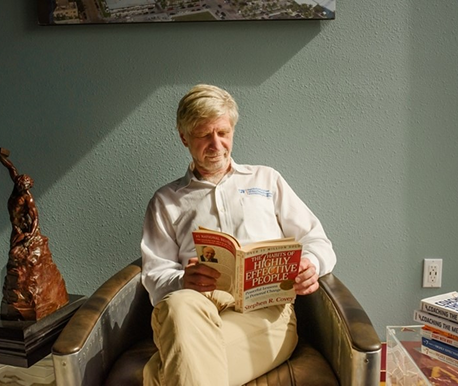“The primary difference between an entrepreneur and a professional business manager, generally speaking, is one of attitude. The entrepreneur, especially when starting out, knows that he is operating on the threshold of success or failure. A single mistake can ruin him. He can’t afford that single mistake. He has to reach a certain market, make a stipulated amount of sales and earn enough money to carry him forward. While others leave the office at five o’clock, he stays behind and works to solve those problems that beset his business. He takes his problems home with him. He lives his business twenty-four hours a day.”
“Managing,” by Harold Geneen**
People ask me what defines an entrepreneur. Hard work, persistence, ambition, desire, drive, a nose for both the bottom line and good ideas. All these traits are musts, but they are just table stakes. At a certain level everyone you compete against has them.
The key extra? The willingness to face fear, to live with doubt, uncertainty, and the possibility of failure and financial ruin. Apprehension? Trepidation? Anxiety? Worry? Angst? Live with it! Many people suffer these emotions at some point. Relatively few voluntarily embrace them or willingly allow them into their lives.
To be a true entrepreneur you not only have to be able to live with the wolf at the door, at times you must invite him in. An entrepreneur can look into the soul-searing darkness of the bottomless chasm and still leap forward into the unknown.
Fear of failure is a powerful motivator. It has enabled many entrepreneurs to create extraordinary successes. Fear isn’t exactly a pleasant emotion to feel on a regular basis, but it does provide an extremely effective impetus. The willingness to face that dark demon, the ability to feel the fear and do it anyway, is the hallmark of an entrepreneur. It can easily be said that under the right circumstances and in the right amounts, fear can be an entrepreneur’s best friend.
**Harold Geneen was president and CEO of International Telephone and Telegraph Corp. (ITT) from 1959 to 1972, growing the company from a medium-sized business with $760M sales in 1961 into a multinational corporation with $17B sales in 1970. Under Geneen, ITT became the forerunner of the modern multinational conglomerate, growing primarily through a series of roughly 350 acquisitions and mergers in 80 countries. At the time of his retirement Geneen was a respected business legend, the Jack Welch of his time. Source: Wikipedia.
This is a classic from the NSC Blog archive. Originally posted April 4, 2008.





